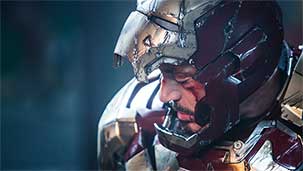Thanks to you, there’s a bit of distance between how much I appreciate that film critics are rallying behind Captain America: Civil War and how much I appreciated the movie itself.
I suppose this distance has something to do with validation; I appreciate the positive outside critical attention because it means the wider world is finally coming to understand why it meant so much for me, as a relatively powerless kid in a small town, to pore through the spinner racks at the local convenience store in search of the latest issues of Iron Man or West Coast Avengers or Guardians of the Galaxy so that I could find out what my super-powered pals were up to in exotic places like New York or California or, say, the volcanic planet of Haven..
In other words, I’m one of those middle-class white male comic book readers who are responsible for the current glut of superhero flicks.
I grew up reading Spider-Man, Avengers, Batman, Justice League, X-Men, and about a decade ago, when Hollywood studios discovered how much money I was willing to spend on indulging my deep nostalgia for those characters, they saw an opportunity. But they pursued that opportunity in a unique way: they didn’t build those films for mainstream audiences. They didn’t water them down, didn’t strip away the deep mythology, didn’t do away with the elaborate costumes, didn’t divorce them, visually or tonally, from the four-color format from which they originated. Instead, they embraced all those things. And, in doing so, embraced the fans that had supported those characters for decades previous. They indulged in the deep mythology. They planted obscure details that only the nerdiest comic fans would pick up. They serialized the stories, had each film give context to the next; missing an after-credits stinger meant you were missing out on an important piece of plot information for the next big blockbuster that was coming along. In short, they found a way to translate comic books onto the big screen so that casual moviegoers and deeply-invested fanboys alike could find sublimity in the cinematic versions of these patently absurd costume-wearing super-folks.
The studios posited that those deeply-invested fanboys (a group of which I am a fringe member) would show up for them all. And they were right. We do. Even the shitty ones. Because, like most “men” of my generation, I haven’t yet found a way to disassociate my adult self from the twelve year-old version of me who lives inside my brain, in stasis, still drinking Coke slushes on the basement floor, flipping through the pages of Wizard magazine, tracing cool Whilce Portacio poses, making lists of cool names for the superheroes I’ll one day make comics about: Nightblood, Nighthunter, Bloodhunter, Killhunter, Deathblood, etc. I am not, as Darwin might expect, an evolved version of that kid. I am a separate entity. And, as his caretaker and protector and father-figure, I will do anything to please him. Like, for example, bring him to a movie in which two teams of superheroes run towards each other across an empty airfield, Braveheart-style, and collide in a flurry of fisticuffs and repulsor-blasts. It’s one of the goofiest things you’ll see onscreen this year. Maybe ever. But it’s also thrilling. It’s a George Perez splash page come to life.
I suppose I feel a certain amount of self-consciousness when watching these films. Like a parent at a school play. What stands out to me aren’t all the things that go well (and in the case of this film, there are a lot of them), but rather all those imperceptible miscues and minor moments of disharmony. And, by the end, the feeling most prominent in my brain and body is one of relief. I’m so worried about what other people are going to think of these movies – serious people, critics – that I can’t fully indulge in what should be a deeply indulgent, personally satisfying experience.
Have I grown up too much to enjoy these objectively enjoyable movies? Are my expectations out of line with those of the perpetual twelve year-old trapped within me?
Whatever the case, my adult self thinks it’s more interesting than most people realize that this summer’s two big superhero spectacles are concerned (in different ways, both philosophically and in net effectiveness) with the very complaints that audiences have levied against such films here in the real world. It seemed a few years ago that we’d reached some pinnacle of CGI-destruction. Like some clever programmer had developed a cost-effective way to render collapsing buildings, and suddenly every film had, as its centerpiece, a scene of large-scale metropolitan destruction. I recall being particularly offended by the climax of Star Trek Into Darkness, in which the annihilation of San Francisco by a crashing starship is barely acknowledged by the screenwriters, or, likewise, the characters onscreen. It was a minor plot point that served only to get us from one scene to the next. But what point is there in stopping the villain after he has killed hundreds of thousands of people? Hasn’t he already won?
The tipping point – in the public consciousness, at least – may have been the ending of Man of Steel, which also features the careless ruination of an entire city, and even less empathy from those, both behind the scenes and onscreen, who were responsible for it (Superman and Lois Lane exchange a tender first kiss atop the smoking rubble). Even the good-hearted new Star Wars movie pays tribute to its ancestor by featuring the destruction of an entire planet by way of super-huge space-laser—but this time we get to see the terrified faces of its population right before they’re incinerated. If you need proof that George Lucas is a better pop filmmakers than he gets credit for, look no further than the fact that he knew better than to show us something like that.
Times have changed since the heyday of Lucas and Spielberg and Zemeckis and all those other summer blockbuster auteurs. There are fifteen year-olds coming to see these Marvel flicks that have never known a world in which images of mass death aren’t a significant part of the culture’s visual vocabulary. Sure, in the 1990s we saw asteroids destroy New York in Armageddon, rivers of lava rolling down the streets of Los Angeles in Volcano, a scale-model of the White House exploded in Independence Day. But the events of 9/11 fundamentally changed the way destruction is depicted onscreen. Even The Avengers, which seems the jauntiest foray into urban catastrophe, gave us enough thrusting clouds and snow-like debris and dust-covered citizens running for cover that it would be impossible for the filmmakers to argue they weren’t purposely invoking the spirit of September 11th.
What I liked most (in retrospect) about Captain America: Civil War is that the plot isn’t precipitated on some grand act of violence. Yeah, there are some bombings along the way, but the fate of the entire world doesn’t hang in the balance. Rather a friendship. And not a deep personal relationship. A professional friendship. It’s essentially the story of two coworkers who come to blows over how best to do their jobs. The villain’s maniacal plan isn’t world domination or mass death, rather to sow distrust. It’s an abstract sort of depravity, but the magic of the film is that it manages to make those stakes feel graver and more immediate than if a super-huge space-laser was pointed at the planet. There are no world engines reversing earth’s gravity, no giant energy domes crackling with electricity. Just a love triangle. Three dudes who want to trust each other, but who can’t.
In the context of contemporary Hollywood’s fetish for exploding buildings, something about that feels extraordinary.
But for all its virtues, the movie doesn’t unfold like a movie. It’s stilted, too fast, too slow, somehow simultaneously compressed and drawn out. Abandoned is the traditional Syd Field plot structure. There are inciting incidents, sure. And rising action, and denouements. But the pace at which they occur is arrhythmic. Everyone is talking about Spider-Man, and about the terrific scene in which he’s introduced (and, yes, it is pretty terrific). But it brings the whole film to a jarring halt, and feels like the opening or closing scene to an episode of a television series. The masterminds who have built the Marvel Cinematic Universe have done an amazing job of serializing these stories, but here, for the first time, the world feels cluttered.
The bombastic action sequence I referenced earlier would, in a film of reasonable length, have been the Big Final Fight, but, in this new age of epics, actually occurs at the midpoint. Everything that follows feels like an addendum, like the hasty replacing of the chess pieces so that the next game can be played.
But I like chess. There are strict rules, yes, but within those rules lies the capacity to produce divine movements. Perhaps Captain America: Civil War is one of those movements. When I was twelve, the threshold for what constituted divinity was much lower, and I hesitate to let that twelve year old still living inside me to alter my expectations. But for a movie like this, maybe I should let him. Maybe I shouldn’t worry so much about the fractured narrative and the moral message and the critical response and just let him enjoy how well the filmmakers have managed to translate the physics and mood and fun of comic books onto the big screen.
Sincerely,

Jared







